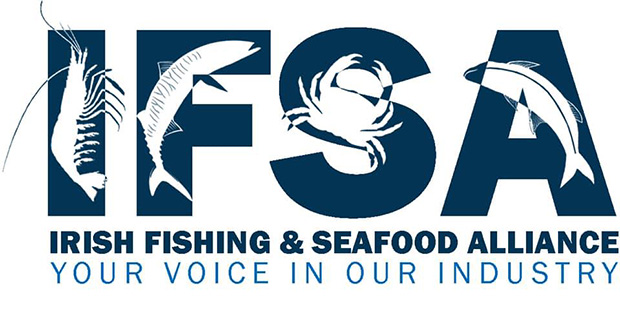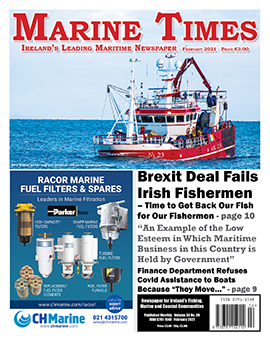The Crying Game
A ‘dirty tricks’ campaign against Ireland’s call for justice is the latest EU Commission stunt - in a bid to shut up the Irish fishing industry’s recent demands following the blatant lack of fair play in the fiasco from the UK/EU BREXIT negotiations which has seen Ireland lose more quota than any other EU member state - writes Cormac Burke, Chair of the Irish Fishing & Seafood Alliance (IFSA)
Whilst the Irish fishing and seafood industry continue to rally public support to put pressure on the Minister to defend Ireland’s situation against an EU Commission that appears to be influenced by other higher powers in the wider fishing industry, the Commission’s answer has been to respond to Ireland with threats of further quota cuts (pelagic sector) – based on supposition and clear lack of evidence.
In a typical scaremongering and threatening report in Irish Times (15th Feb.) the EU Commission has concluded that between 2012 and 2016, “Ireland has overfished its quota of mackerel by 28,700 tonnes, horse mackerel (scad) by 8,100 tonnes and blue whiting by 5,600 tonnes”.
The article further added that, as a result of this, the Irish pelagic sector could be facing a deduction of this same volume of quota over the coming years as well as facing exemption from €40 million in EU funding for various projects.
While obviously sounding quite alarming, this news has the dual purpose of (a) trying to stop Ireland pushing for an investigation of the EU’s BREXIT negotiations and (b) to again attempt to con Ireland’s general public into believing that the Irish fishing industry is populated solely by crooks and undesirables.
.jpg)
But, casting aside all this typical anti industry propaganda, Ireland’s fishing industry has some genuine and factual points that need highlighting:
1. The so-called ‘formal administrative EU inquiry’ referred to in the article comes from a 2018 EU audit of Ireland’s pelagic fisheries (i.e., controls in weighing & recording as well as general monitoring and inspection) – a report which is largely based on feedback and opinion from disgruntled staff of the dysfunctional Sea-Fisheries Protection Authority (SFPA) – a group which has become so beyond accountability that they are at this stage neither answerable to the fisheries minister or the Department of Marine.
The response to the EU from the Irish Government to the allegations in this 2018 audit have never been made available to the industry and, despite widely publicised major investigations in three Killybegs fish processing factories, only one of the Co. Donegal companies was charged with irregularities while the other two were cleared due to lack of any evidence of handling or processing any illegally caught or ‘over quota’ fish.
2. The SFPA, whose apparent ‘feedback’ played such a central role in the formation of the EU audit of the Irish industry, were themselves subject to a Price Waterhouse Cooper (PWC) Report in 2020 and, in its executive summary, concluded that “our investigation has uncovered significant challenges relating to the strategy, operating model and culture within the SFPA” – leading one to wonder how can the EU Commission justify threatening Ireland based on heresy and unproven allegations from an organisation that is clearly struggling with internal problems;
This threat conveniently comes at a time when the EU Commission, again at the prompt of the SFPA, is trying to do it best to further hamper the Irish pelagic fishing industry by setting restrictions in place that seem to apply only to Ireland.
Traditionally an Irish pelagic vessel lands at the quayside with mackerel, scad, herring or blue whiting which has been kept in top condition by being stored in the vessel’s RSW (refrigerated sea water) tanks after it was caught – and a pump is used to send the fish & chilled water into a tanker which also already contains chilled water – the need for the use of chilled water during transportation at sea and from point of landing to the processing point is a vital part in maintaining the pristine fish quality and to avoid the fish being crushed and damaged by its own weight, with the knock-on effect of poorer prices returned for fillets showing ‘blood spots’ (bruising) in the flesh.
To be clear at this point, the vessel’s log book has already recorded how many tonnes of fish are on board, and SFPA fisheries inspectors randomly visit these boats and ‘dip’ the RSW tanks to calculate and ensure that the volume of fish on board matches the logbook recordings.
Once at the processing factory, the fish is then inspected by SFPA Officers as it goes through a weighing process – and the final tally is also double checked in that the eventual number of frozen cartons (@ 20kg each) should equal the volume which originally arrived to the factory.
However, with SFPA officers no longer willing to spend time standing around in fish factories, they encouraged the EU Commission to look into a ‘weighing at point of landing’ rule (that does not apply in most other nations as they have the processing factories on the quayside and no transportation of fish is required).
Ireland has had a derogation which allows for accurate weighing of the fish in the factories and this is in fact in the Irish ‘Programme for Government’ – but for Ireland to allow the EU Commission, at the behest of the SFPA, to remove this will leave a totally impractical situation for the pelagic industry.
All pelagic skippers and all processing companies believe that to maintain the quality of these high value species, the fish needs to be transported in at least 30% water – but the EU Commission is recommending only a 2% water tolerance as the tankers drive over a weighbridge.
Some pelagic vessel owners have refused to allow this destruction of the catch and, at the insistence of the SFPA, the fish PLUS water in the tanker was therefore weighed as fish and deducted from that vessel’s quota – one case alone in March of last year saw a Killybegs’ vessel lose a staggering €178,000 worth of quota (water weighed as fish) in one landing.
Frustration
The Irish pelagic industry has attempted to work with the SFPA in recent years to see exactly what system they wanted to use – which transpired to be something akin to an old steel box that the fish would drop into through the top and travel down a chute, out of water and banging off the sides and off themselves and slide down into an almost dry plastic bin (with a water allowance of just 2% water being allowed).
Trying to explain that such an operation would destroy the quality (and price) of the fish, the members of the pelagic industry came together to invest in a unique landing system (approved by NSAI) whereby the fish would remain in water but travel up a riser belt to a dual belt system where air fans would blow off excess water and a constant weighing system could simultaneously record the weight of the fish as it passed before being returned to a proper volume of water.
Despite this private investment in a €500,000 state-of-the-art piece of engineering marvel, the SFPA have stubbornly refused to accept it and the argument continues to go on – but meanwhile, and as a result of the SFPA’s insistence to want almost ‘dry weighing’, it isn’t just Irish vessels that are suffering – the large numbers of Danish and Scottish vessels that come to Ireland each year to land vital pelagic volumes to Irish processing factories is dwindling rapidly – and who could blame them?
Call to arms
If there was ever a time for an Irish fisheries Minister, his Department and indeed the Government itself, to start to show some backbone it is now.
Many inhabitants of Ireland’s coastal communities are already ashamed at how repeated governments of this country have placed so little importance on our marine resource whilst the Governments of other seafaring nations the world over stoutly and with pride, defend their waters and those that make a living from it.
Ireland is already the laughing stock of the European Union for its timid acceptance of all regulations for the past 40 years and sadly there is even a hint of pleasure by our own Government at every opportunity to further knock back its own fishing industry while other nations ‘make hay’ in our waters.
The fact that our own Department of Marine can advise a Minister to take seriously the threat of EU penalties based on comments from the SFPA – a wholly discredited and untrustworthy organisation – speaks volumes about the current state of affairs.
To be very clear, the issue raised by the EU was NOT a systematic failure by fishermen and fish processing companies to comply with the quota restrictions that exist.
It is in fact an indictment of the SFPA for failing to implement the control plan that they themselves put forward to the EU and the EU approved.
The reason the EU approved it is because it is fit for purpose but the failing lies squarely with the SFPA for being incompetent and incapable of implementing that plan.
Our Government has loaded the blame wrongly on the very industry it is mandated to protect rather than accept the failings of their own agency and correct the issue by addressing the problems in the SFPA.
Coming in the midst of Ireland’s struggle to seek justice from the outrageous EU/BREXIT deal, this latest threat from the EU Commission is simply another act of a bully -- Ireland now has a choice between yet again rolling over for its EU masters and the bigger foreign interests or for once ‘grow a pair’ and defend our sea faring nation.



.jpg)
.jpg)
 Facebook
Facebook Twitter
Twitter